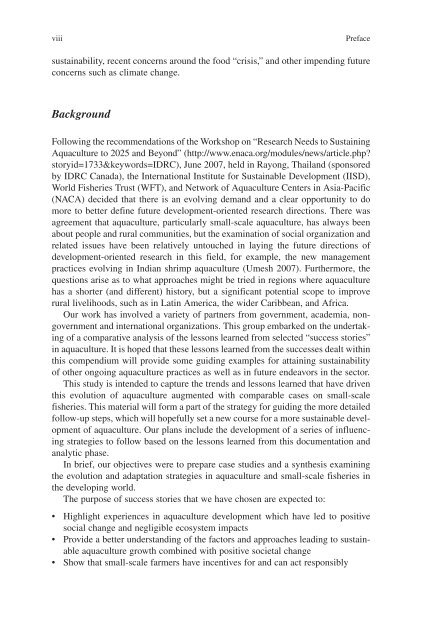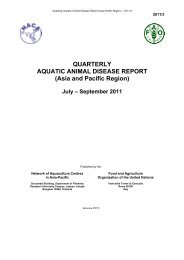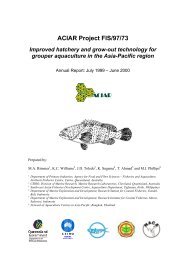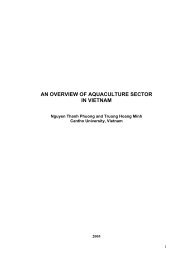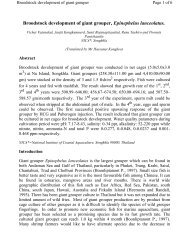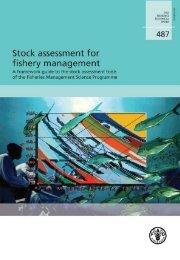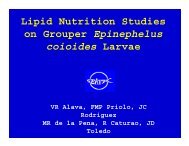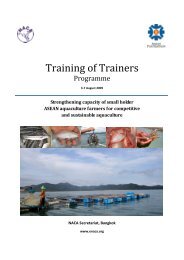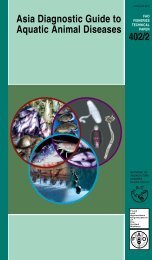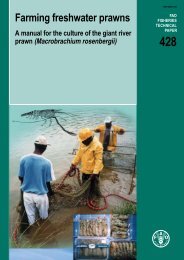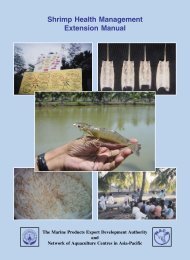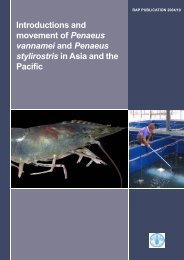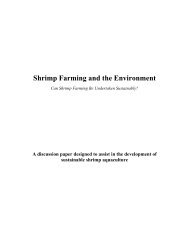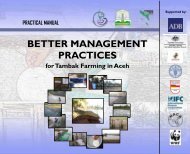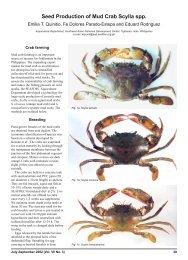Success Stories In Asian Aquaculture - Library - Network of ...
Success Stories In Asian Aquaculture - Library - Network of ...
Success Stories In Asian Aquaculture - Library - Network of ...
- No tags were found...
You also want an ePaper? Increase the reach of your titles
YUMPU automatically turns print PDFs into web optimized ePapers that Google loves.
viiiPrefacesustainability, recent concerns around the food “crisis,” and other impending futureconcerns such as climate change.BackgroundFollowing the recommendations <strong>of</strong> the Workshop on “Research Needs to Sustaining<strong>Aquaculture</strong> to 2025 and Beyond” (http://www.enaca.org/modules/news/article.php?storyid=1733&keywords=IDRC), June 2007, held in Rayong, Thailand (sponsoredby IDRC Canada), the <strong>In</strong>ternational <strong>In</strong>stitute for Sustainable Development (IISD),World Fisheries Trust (WFT), and <strong>Network</strong> <strong>of</strong> <strong>Aquaculture</strong> Centers in Asia-Pacific(NACA) decided that there is an evolving demand and a clear opportunity to domore to better define future development-oriented research directions. There wasagreement that aquaculture, particularly small-scale aquaculture, has always beenabout people and rural communities, but the examination <strong>of</strong> social organization andrelated issues have been relatively untouched in laying the future directions <strong>of</strong>development-oriented research in this field, for example, the new managementpractices evolving in <strong>In</strong>dian shrimp aquaculture (Umesh 2007). Furthermore, thequestions arise as to what approaches might be tried in regions where aquaculturehas a shorter (and different) history, but a significant potential scope to improverural livelihoods, such as in Latin America, the wider Caribbean, and Africa.Our work has involved a variety <strong>of</strong> partners from government, academia, nongovernmentand international organizations. This group embarked on the undertaking<strong>of</strong> a comparative analysis <strong>of</strong> the lessons learned from selected “success stories”in aquaculture. It is hoped that these lessons learned from the successes dealt withinthis compendium will provide some guiding examples for attaining sustainability<strong>of</strong> other ongoing aquaculture practices as well as in future endeavors in the sector.This study is intended to capture the trends and lessons learned that have driventhis evolution <strong>of</strong> aquaculture augmented with comparable cases on small-scalefisheries. This material will form a part <strong>of</strong> the strategy for guiding the more detailedfollow-up steps, which will hopefully set a new course for a more sustainable development<strong>of</strong> aquaculture. Our plans include the development <strong>of</strong> a series <strong>of</strong> influencingstrategies to follow based on the lessons learned from this documentation andanalytic phase.<strong>In</strong> brief, our objectives were to prepare case studies and a synthesis examiningthe evolution and adaptation strategies in aquaculture and small-scale fisheries inthe developing world.The purpose <strong>of</strong> success stories that we have chosen are expected to:• Highlight experiences in aquaculture development which have led to positivesocial change and negligible ecosystem impacts• Provide a better understanding <strong>of</strong> the factors and approaches leading to sustainableaquaculture growth combined with positive societal change• Show that small-scale farmers have incentives for and can act responsibly


